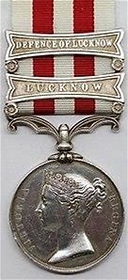An old soldier
Living in East Street in 1881 was a retired soldier, a Chelsea Pensioner by the name of James Dyster. Sergeant Dyster was not to die until 1900, when the whole country awaited news of the Relief of Mafeking. Sergeant Dyster had been following the events closely as he had been involved in military sieges himself, but unfortunately he died only days before news of the British victory arrived.
James Dyster was born in Feering in 1830 and christened at the Independent Chapel in Stoneham Street. His father, Joseph, was an agricultural worker who, in 1838, found himself on the wrong side of the recent Poor Law legislation. Joseph had developed a leg abscess so serious that the surgeon he consulted certified him not to work for two weeks. He applied for relief from the Lexden and Winstree Board of Guardians and was given six loaves of bread. Then it was discovered that he had in fact earned ten shillings for a week's work, money he said had been used to pay off debts. He was advised that the likely sentence for the fraud he had committed was seven year's transportation. Fortunately, his employer spoke on his behalf, stating that he had not been fit to work but had done so anyway, giving him a good character and guaranteeing that the cost of the bread would be repaid. Dyster gave his promise and was released.
By 1851, a young man named James Dyster and born in Feering, an agricultural worker, presumably out of work, was listed as an inmate at Witham workhouse. Once in the workhouse you would be fed and clothed, but would be expected to work - no Jobseeker's Allowance then. From there it would be a natural progression to enlist for a soldier. James Dyster was to see action in some of the major conflicts of the mid Victorian period.
Buried with Sergeant Dyster in 1900 were his medals, including two from the Crimean War. He had the campaign medal with a clasp for Sebastopol. Here the Allies - Britain, France and Turkey, had laid siege to Sebastopol which was occupied by the Russians. He also received the Turkish Medal.
From the Crimea, the unit James Dyster belonged to, the 90th Light Infantry (Perthshires), were on their way to China when the Indian Rebellion reached crisis point and they were diverted to assist. James Dyster's third medal related to this period when he was involved in the the siege of Lucknow where British forces and civilians were being held by rebel besiegers. He had two clasps, suggesting that he was involved in both phases of the relief of Lucknow. It was here that he received a serious leg wound which was to affect him for the rest of his life. In all he served in India for almost six years.
Dyster's discharge came in 1871 on the Isle of Wight where he was resident at Parkhurst Barracks. He had requested the discharge as he had over twenty years's service and had complete the term of engagement -he may have signed on for twenty years. He was granted a pension of one shilling and nine and a half pence a day. Chelsea pensions were based directly on rank and good conduct records. Dyster was said to be of good character, but was no angel. Early in his career he was twice promoted to Corporal and then Sergeant but then reduced to the ranks for offences such as "allowing a man in his charge to get drunk" or "making away with rum". This would affect his pay but also his final pension.
In later years, Dyster was to appear in the papers again, this time as witness to an out of control dog which had bitten William Nunn the blacksmith on the leg, causing him serious injury. This case took up five hours of time at the Braintree court and, despite its seriousness, seems to have occasioned much laughter, particularly about the character of the dog which Nunn had taken it upon himself to shoot.
When Sergeant Dyster died in 1900 he had no immediate family living. An application was made for a military funeral but this practice had been discontinued only three months previously. Had some local people not stepped forward to pay for his funeral he would have been buried in a pauper's grave.


Comments
Post a Comment